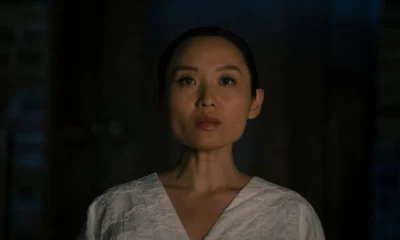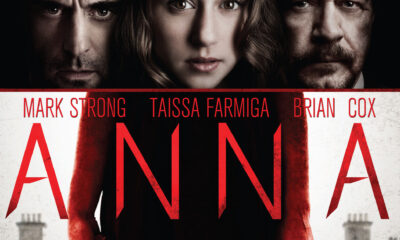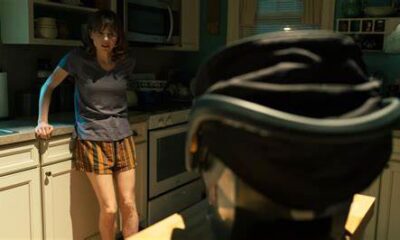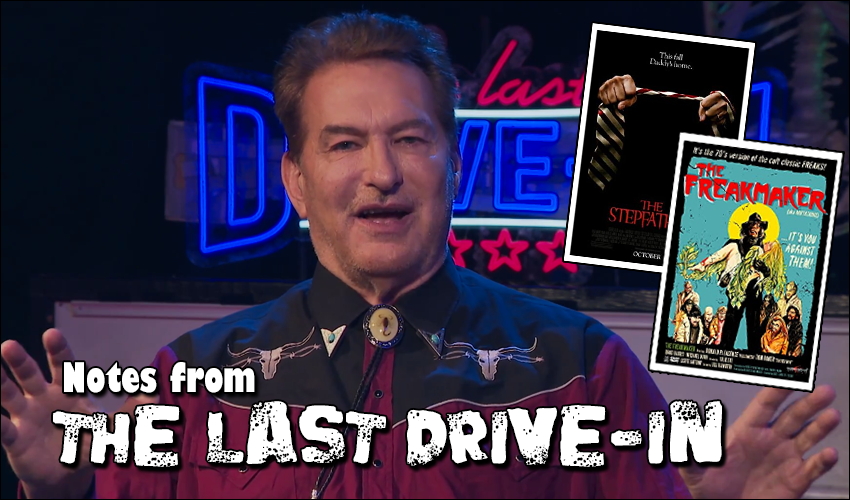
Notes from the Last Drive-In: S4E8 – ‘The Stepfather’ and ‘The Freakmaker’
Welcome to Notes from the Last Drive-In, Haunted MTL’s review and recap series, tackling a “bad Daddy” night with Joe Bob Briggs and Darcy the Mail Girl. This week we cover The Last Drive-In S4E8 featuring The Stepfather (1987) and The Freakmaker (1974). So how does Daddy’s night fare compare to Mommy’s night last week?
What delights and horrors were to be found on Shudder this past Friday, June 16th?
The Stepfather (1987)
The Stepfather is a 1987 psychological horror film that best matches the “Bad Daddy” vibe of the evening. Directed by Joseph Rubin, the film was written by Carolyn Lefcourt, Brian Farfield, and Donald E. Westlake, with Westlake taking screenplay duties. Patrick Moraz handles the film’s music, while John W. Lindley and George Bowers tackle cinematography and editing duties, respectively. The movie stars Terry O’Quinn, Jill Schoelen, Shelley Hack, and Stephen Shellen.
The Stepfather follows a serial killer, Henry Morrison (Terry O’Quinn), who takes on a new identity and family periodically, murdering them when he feels they have failed to live up to his ideals of a family. He ends up meeting with a widow, Susan Maine (Shelley Hack), and taking in her daughter, Stephanie (Jill Schoelen). Meanwhile, interested parties, including Henry’s brother-in-law from a previous victim, Jim (Stephen Shellen), threaten to unravel Henry’s whole scheme.
So, how does this “Bad Daddy” movie fare? As a whole, the movie is competent but doesn’t exactly stand out. The film has become a cult classic, but that is mainly on the back of Terry O’Quinn, the only actor in the film given a compelling character. O’Quinn is fantastic as Henry, tapping into menace, rage, and Conservative-Christian geniality within an instant, sometimes within the same scene. Though he is not officially the lead of the movie, O’Quinn is pretty much the lead by having a real presence. Though many talented people are involved at all production levels here, it seems like the only person who came out of The Stepfather with something to be genuinely proud of is the future John Locke from Lost.
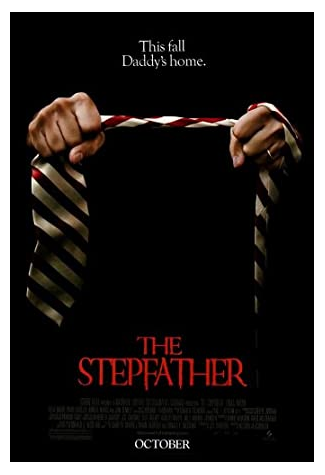
Jill Schoelen is a picture-perfect scream queen, equally beautiful and strong, but she has little to do in the film, nor do we even find a reason to root for her. Her early anxiety surrounding the new father figure makes sense, only to be seemingly abandoned partially into the third act, where it comes out again. I don’t get a real depth from her performance. Nor do I get that from Shelley Hack, either. It’s unusual how two strong actresses offer little in this movie. Jim Ogilvie’s manic performance is interesting but feels out of sync with O’Quinn’s “Bad Daddy” and ends up puzzling by the film’s end.
The writing isn’t great. The film itself doesn’t sell the sense of menace all that well, and any tension we may feel is because of the acting choices instead of story beats and scenes meant to create depth. Only two moments struck me as surprising. One was a murder with a wooden beam sold mainly by an explosively violent performance. The other was the hilarious frankness by which one plotline, woven through the entire film, is resolved in seconds. The latter was an unintended result, but I think it is indicative of some of the storytelling problems within the story. A lengthy sequence illustrates the process of preparing for murder and skipping out for a new town, but it just takes up so much of the runtime that could have helped develop other characters.
Technically speaking, this film isn’t overly impressive. I think the cinematography is suitable but only does something special in the third act featuring a long-held shot where a character gets uncomfortably close to breaking the fourth wall. The editing is serviceable as well. I have no real complaints, but I did not feel particularly wowed by any directorial choices. The music was a downside to the film; however, often grating and inconsistent with the film’s tone, the juxtaposition rarely worked. There were some rare instances when it did, but not nearly enough.
Joe-Bobservations on The Stepfather
One of the more entertaining host segments of the night was Joe Bob dipping back into the injustices of childhood, discussing the cynical world of the newspaper delivery boy. Inspired by the idyllic streets shown in the film, Joe Bob spoke at length about the scam that was the paperboy job, and we even learn that he was a paperboy as a child. It is a hilarious sequence, and you get the sense that he is still pretty heated about it today.
The big topic, beyond the background of the film and cast, which is all very interesting, was the discussion of the true-crime story that inspired the film. The murders of John List are infamous for being some of the most significant and brutal family crimes in criminal history. In many ways, the brief summation of the tragic events by Joe Bob was even more compelling than the movie that pulled from the actual murders. It shows that Joe Bob and his interest in true crime is something that Shudder would be wise to tap into for a documentary series.
Joe Bob made much hay about the exploitation background of Joe Rubin, but the real story was, unsurprisingly, about how good Terry O’Quinn is in the film. His audition was supposedly fantastic and chilling, and I would have loved to have seen that.
Final Thoughts on The Stepfather
The Stepfather is one of the more below-average drive-in movies we’ve had on the show, but that isn’t entirely bad. However, most of my enjoyment came from the wrappings of The Last Drive-In as opposed to the movie for the night’s first half. With only one character with any real agency or interest, mediocre production values, and some comically puzzling writing choices, I don’t think I could recommend much with The Stepfather beyond “see it once.” It was not just a “Bad Daddy” movie; it was also just bad.
Joe Bob Briggs gave The Stepfather 3 out of 4 stars. I give The Stepfather 2 and 1/2 out of 5 Cthulhus.
 (2.5 / 5)
(2.5 / 5)
Best Line: “Wait a minute, who am I here?” – Henry/Jerry, seconds before disaster
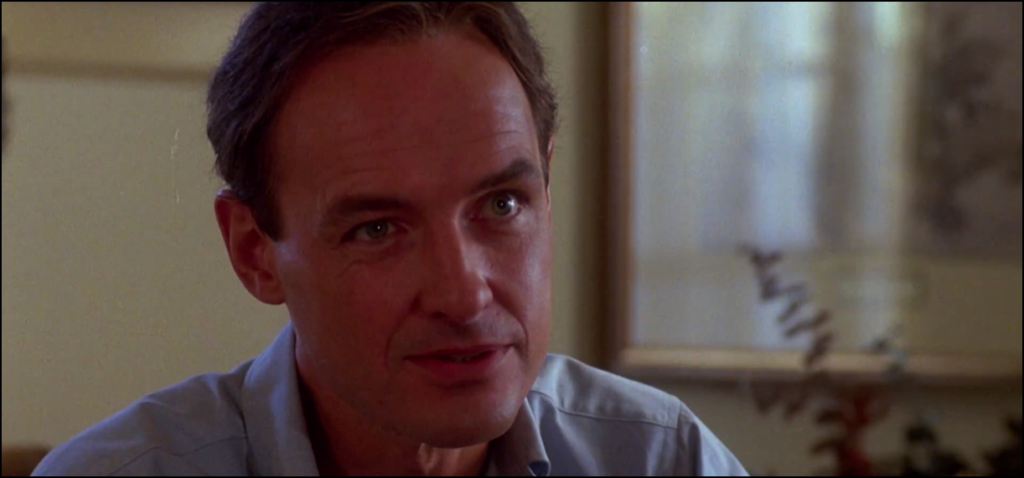
The Freakmaker (1974)
The Freakmaker, sometimes known as The Mutations, is a seldom mentioned 1974 science horror film with an unusual pedigree and excellent, notable cast that ends up doing little to salvage this B-picture. It is a curious artifact of 1974 that, while novel, doesn’t prove compelling. Yet, Joe Bob Briggs does have his fascination for this weird little movie, but I doubt the Mutant Fam will take after it as well as they did with The Legend of Boggy Creek.
The film was directed by legendary cinematographer Jack Cardiff, who strangely hands the cinematography duties to Paul Beeson. The film was written by Edward Mann and Robert D. Weinbach, the latter who served as a producer. John Trumper steps in as editor, while the basic is handled by Basil Kirchin and an uncredited Jack Nathan. The film stars Donald Pleasance, Tom Baker, Brad Harris, Julie Ege, Michael Dunn, and Jill Haworth. The film also features a cadre of professional circus Freaks who lend their talents and authenticity to the sideshow setting for part of the film, including Willy “Popeye” Ingram, Esther “Alligator Girl” Blackmon, Hugh “Pretzel Boy” Baily, and Felix “Frog Boy” Duarte.
The Freakmaker features a group of students (Julie Ege, Jill Haworth, Scott Antony) and a visiting scholar, Brian (Brad Harris), who find themselves in the experiments of Dr. Nolter (Donald Pleasance) and his deformed assistant Lynch (Tom Baker). The two create genetic mutants combining human and plant characteristics, pawning off the failed results to a local Freakshow. Tensions arise between the experimenter, Nolter, the experimentees, and the Freaks, led by Burns (Michael Dunn), who rallies against the abuses of Lynch.
The “Bad Daddy” theme is a bit looser with this film but still pretty apt. The movie itself, however, is a mess. The film struggles between predictable plotting, homages that border ripoffs to stronger films, and a mixed bag of performances. Furthermore, the direction is stilted, which is odd from the director of Sons and Lovers (1960).
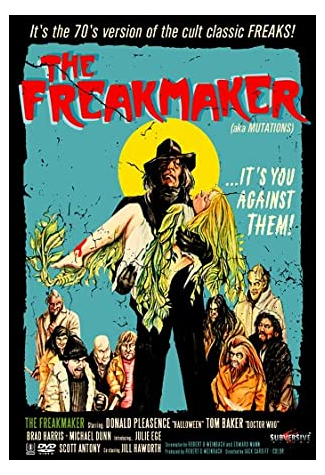
The story isn’t that good. Some ideas are interesting, but the way the concepts are delivered or developed is incredibly lacking. The film opens very slowly with what feels like a student film about the fungus life cycle as a metaphor as an understimulated Donald Pleasance recites memorized pseudoscientific lines. This is one of those rare instances where even I, a mighty reviewer who has managed to stay up for every movie shown on The Last Drive-In, felt my eyelids grow heavy. This is the most egregious example of the film’s ponderous, plodding, and talky nature.
With that being said, some of the ideas expressed in the dialogue are fascinating, but Donald Pleasance, usually an actor I am excited to see, doesn’t make it work. The cloning, genetic engineering, and the like theories are well ahead of their time here, even if they are couched in verbose nonsense. The film is at its best when it directly takes from Todd Browning’s Freaks (1932), but even then, it is a pale imitation. I’d rather be watching Freaks.
The other performances are fine, perhaps with Tom Baker having the most stirring of the bunch as a Freak who finds himself rejected in both worlds. He has a deeply sad scene with a sex worker that reveals his most significant insecurity, but it is a tantalizing tease and a more exciting story that does not get explored. Everyone else is just there to fill undercooked characters, and there is little agency for any of them to act upon. The ostensible protagonist accomplishes little, and the Freaks, fascinating that they are, only have a few moments before their sudden awkward action at the end of the film.
Even from a technical standpoint, the movie does not wow. I wasn’t overly taken with the direction from Jack Cardiff, nor were the editing and cinematography particularly interesting. The creature effects were decent enough, but ironically they looked to be on par with something in an episode of Dr. Who.
Joe-Bobservations on The Freakmaker
What became readily apparent as the film started is that Joe Bob has a soft spot for The Freakmaker. I can see why, too. Even if the movie isn’t the best I have seen on the show, it is a solid drive-in movie because it hits all the marks for Blood, Breasts, and Beasts. A lot of the apparent love for the film from our favorite horror host seems to originate with his interest in the subject matter of the Freakshow. During his host segments, he spent a lot of time talking about the people he interviewed and his love of the classic Freakshow. He also brought up an important point: if we are supposed to be body positive, is it fair to remove their opportunities for work?
Between Joe Bob’s discussions of the history of the Freakshow and the people who made them possible and his exciting stories about the cast and crew, there was also a hilarious moment of self-awareness as he just could not stop talking. It was charming to see Joe Bob break during one host segment, rattling off factoid after factoid, much to the chagrin of director Austin Jennings. I didn’t laugh quite as hard as the overly long Drive-In total for The Freakmaker, but it was a hilarious moment. Maybe the best part of the “Bad Daddy” evening.
Final Thoughts on The Freakmaker
I wish I could have enjoyed The Freakmaker more. It’s a strange little “Bad Daddy” movie, and had there been a bit more passion for the project across the board, I feel something fun could have really been found. Between a weak story, some overly-on-the-nose homages to Todd Browning’s Freaks, and curiously lifeless performances, there isn’t much to The Freakmaker that I enjoyed. I see the sketches of what I feel might work as a better film, but that’s not the point of this review.
Joe Bob Briggs gave The Freakmaker 3 out of 4 Stars. I can only give The Freakmaker 2 out of 5 Cthulhus.
 (2 / 5)
(2 / 5)
Best Line: “You’re a pretty one though, aren’t you. Look, spend a little extra, and I’ll be extra nice to you. Or shall I give it to you straight? Short and sweet. Two pounds.” – An intensely affordable sexworker to Lynch
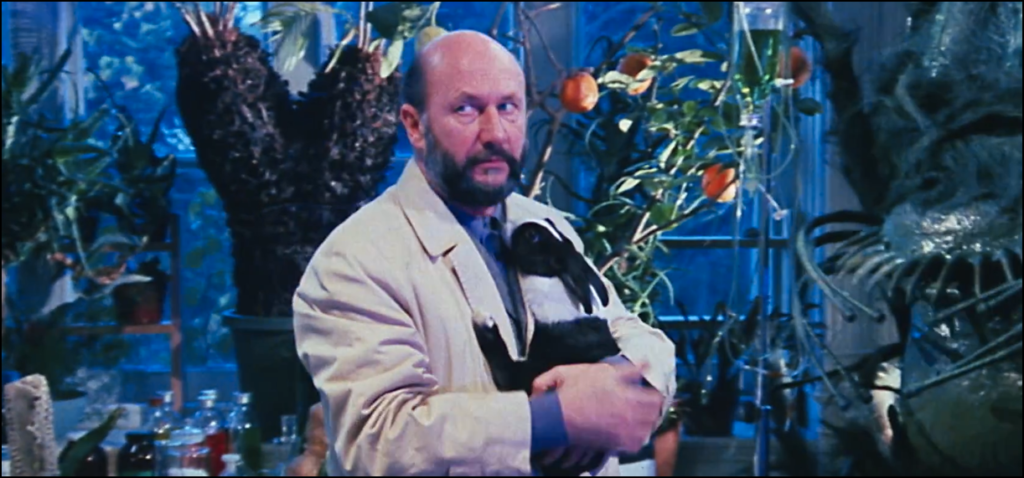
Haunted MTL Drive-In Totals
As usual, we have the official Drive-In Totals direct from Shudder. Tweet #2 is particularly intense!
As for our Drive-In Totals for the show, we have:
- 2 “Bad Daddy” Movies
- 52 Weeks of Movies
- 65 Years of Father’s Day Legislation
- 12 Year Production
- Overly Involved Psychologist
- Assault and Daddery
- Holiday Ranting
- Evidence Dumping
- Childhood Trauma Regressing
- Gratuitous Bathing
- Plate Kicking
- Gratuitous Lifetime Movie of the Week Musical Score
- Gratuitous Fu Description Fu
- Leaf Fu
- 2×4 Fu
- Killer Quip Fu
- Clipboard Fu
- Freak Fu
- Reverse Time-lapse Fu
- Corpse Rolls
- Darcy Cosplay: Genderbend Stepdad
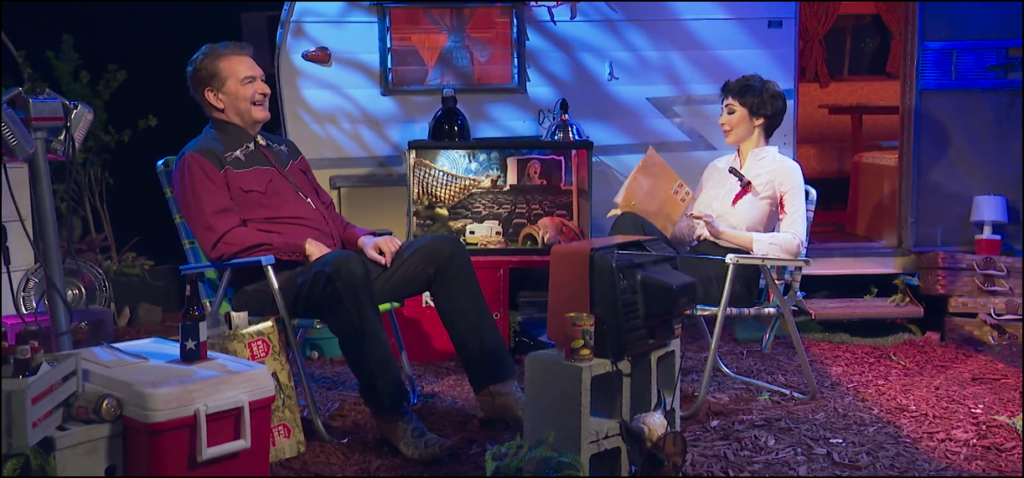
Episode Score for the Last Drive-In: S4E8 – The Stepfather and The Freakmaker
It was a night for the “Bad Daddy” at The Last Drive-In. But how was S4E8, featuring The Stepfather and The Freakmaster, as a whole? Not great, if I am being honest. It was still an enjoyable night, but the films took a sledghammer to the overall evening. The theme felt appropriate, and the film choices made sense, for the most part, but the quality of the films was a real sticking point for me. I guess I am glad I’ve seen them at least once in my life. I don’t think I’ll be seeking them out again.
With that said, however, the show itself put together by the cast and crew of The Last Drive-In was a quality one. The “Bad Daddy” theme introduced some interesting discussion topics, even if those topics were more interesting than the films themselves.
I would give this episode of The Last Drive-In 3 1/2 out of 5 Cthulhus.
 (3.5 / 5)
(3.5 / 5)
And with that, we are done for the week. What did you think of the movies? Did you have a favorite? Will you ever watch them again? Let us know in the comments. We’d love to hear your thoughts. “Do you have any “Bad Daddy” film recommendations?
Please join us on Twitter next Friday as we live-tweet with the rest of the Mutant Fam during The Last Drive-In with Joe Bob Briggs.
Want more of The Stepfather? (Sponsored)
Add The Stepfather to your collection by picking up a Blu-ray using our Amazon sponsored link.
Movies n TV
Wheel of Time A Question of Crimson Is a Political Espionage Delight
Episode two of Wheel of Time felt like the beginning of a long journey. Stories are unfolding, lives are changing, and blood is spilling.
Let’s discuss.
The story
We begin this episode in the past with Elayne’s mother, Queen Morgase. It turns out her rise to the throne was a bit, shall we say, cutthroat. So when she shows up at the White Tower, Siuan is concerned.
She might have reason to be, too.
Meanwhile, Rand, Egwene, Moiraine, Lan and Aviendha are in the Spine of The World. As they travel through some of the most breathtaking lands I have ever seen on a TV show, Egwene is plagued with nightmares. We think at first that’s just her trauma working itself through her system. But we soon find out that it might not be that straightforward.
Finally, Perrin returns home to heal after his hand is almost cut in half. But when he gets there he finds the town has been infested by Children of The Light. And they’re looking for him.
What worked
There was something heartwarming in this episode about political espionage and choking religious persecution. And that is Elayne’s relationship with her family.
I have consumed a lot of fantasy content with royal families. And I have never once heard a princess call her mother ‘Mum’. I’ve never seen royal siblings get along. And I have sure as hell never seen a princess have a good relationship with her step-parent.
This was refreshing. Even though Queen Morgase is kind of a horrible person she seems like a good mother. And that’s an unexpected delight.

Of course, this is just one storyline among many. And while this can sometimes be overwhelming, in this case it wasn’t.
I’ll be honest, some of these storylines are going to drag for me. I know this because I’ve read some of the Wheel of Time books and I have an idea that not all the characters exactly pique my interest.
No one likes all the characters. No one likes all the storylines. While I am here for the political espionage between Queen Morgase and Siuan, not everyone likes it. While others might be fascinated with Selene trying to win Rand back, I couldn’t care less.
Having multiple storylines keeps everyone’s attention better. So long as things don’t get out of hand. Things can easily get out of hand. But this seems to be managed well.
So far.
What didn’t work
As I mentioned above, I’m not thrilled with Rand’s story at this point. And while it’s fine to not like a storyline when there are this many to choose from, it’s not fantastic that the one I like the least is the one involving our two main characters. And anytime we were with the team at the Spine of The World, the only thing that brought me joy was Moirain’s hat. It reminded me of Stockard Channing’s hat in Practical Magic.
The problem is that Rand is Charlie Brown with controversial magical powers. He is boring, serious, and pessimistic.
And yes, I understand that he has a heavy emotional burden and he’s the Dragon Reborn and that’s quite taxing and all. But let’s be fair, there isn’t a single person in this show that doesn’t have a heavy burden. And most of them manage to be fun occasionally.

All that being said, this episode of Wheel of Time did exactly what it needed to do. It set up conflicts at each of the three locations. It established emotional ties between the characters and the events. And it established goals for everyone.
This was, in short, a solid episode. Not groundbreaking, not mind-blowing or life changing. It was simply good. It was entertaining and moved the plot forward.
Well done.
 (3.5 / 5)
(3.5 / 5)
Movies n TV
Wheel of Time Returns With A Bang
Wheel of Time is back for season three. There are mixed feelings regarding this. Last season, there were some serious pacing issues. And some serious sticking to the book’s storyline issues. But we’re two seasons in, and we don’t give up so easily. So let’s dive into episode one, To Race the Shadow.
By the way, I highly recommend watching this episode with the subtitles on. You’ll see why.
The story
We begin this episode with Liandrin facing a trial of sorts for her rampant betrayal. She does her best to gaslight her Aes Sedai sisters into thinking that Siuan Sanche is the real traitor.

When that doesn’t work, she reveals how many Black Aes Sedai have actually infiltrated the tower.
Spoiler, it’s a lot.
In the aftermath, our whole team gathers to drink and enjoy one night of relaxation before they head out to the Tear to form an army for Rand. All is going well until they’re attacked by myriad creatures and a sentient axe.
What worked
This episode was long. It had a run time of an hour and eleven minutes. And a lot of that run time was spent in heavy dialog scenes.
Fortunately, these were well-done scenes.
If you’re going to have a lot of talking scenes, there are good ways and bad ways to do it. Last season, we saw lots of examples of the bad way to do it. But this episode did it well. For one thing, other things were going on while conversations were taking place. The characters are drinking, playing games, walking through an interesting city. And the scenes themselves didn’t stretch out. They weren’t repetitive. We heard what the character had to say, then we moved on.
It was also nice that the point of these scenes wasn’t just info dumps. We had character development. We had romantic interactions. We had plot development and foreshadowing.
Overall, this episode felt like what it was. A moment of calm before a storm.
Taking a step back, I’d be remiss if I didn’t address the fight scene at the start of the episode. Because it was epic.
The magic looked amazing. The martial arts that went along with it looked fantastic. The costumes were beautiful. It was just incredibly fun to watch.
More than that, it was emotional. We lost some characters in that fight that were important. And it was clearly emotionally shattering for many of our characters, who found themselves betrayed by people they trusted.
So many of them.
It was a great way to open the season.
What didn’t work
Despite that, this episode wasn’t without its flaws.
First off, there were a lot of dialog scenes. And they were good scenes, as I’ve already discussed. But it was one after another after another. And when your episode is, again, an hour and eleven minutes, it’s maybe a little much to have so much chit-chat. Couldn’t some of these conversations, important as they were, have been moved to maybe another episode?
Finally, I want to talk about Egwene’s travel through the arches.

I feel like maybe there were some deleted scenes here. Because there must have been more to that visit than what we saw, right?
We could have seen Egwene battle Rand. That would have been badass and emotionally devastating. We could have seen her with a quiet life with Rand back home at the Two Rivers. We could have seen anything except for the quick clip of Rand in a bloody river, followed by Egwene being shoved back out in a bloody shift.
No products found.
Bad job. But at least it wasn’t an extended scene of Moiraine collecting bathwater, and then taking a bath while looking sad. If we’d started this season with another scene like that, it might have broken my brain.
Amazon dropped the first three episodes at once. So we’ll be back soon to talk about episode two. See you then.
 (4 / 5)
(4 / 5)
Movies n TV
Entertaining as hell: Eight Legged Freaks (2002) Review
Early 2000s is a special era for the industry. It accepts the cheesiness and corniness of movie making, in turn producing some gems in their own right. Eight Legged Freaks starring David Arquette and young Scarlet Johanson is a horror comedy about giant spiders who overtake a small town. As crazy as that premise sounds, the movie surprisingly has a ton of heart and is super entertaining. Let’s review, shall we?
Plot
We start Eight Legged Freaks with a shot of toxic waste spilling into the water supply of Joshua, a spider farm owner. He is friends with Mike, one of our protagonists, who is a science geek and a spider enthusiast. Mike notices something quite right upon visiting Joshua, but no one takes him seriously. We are then introduced to the rest of the crew. Mike’s mother Samantha, the town sheriff, is too busy chasing Ashley, his sister, who is dating the town mayor’s son Bret (something Samantha does not approve of). We also have Chris, who returns to the town to save his father’s legacy in the town mines. He has opposition from Wade, Bret’s father, who wants to use the mines for his business ventures. Lots of drama going on that will only get juicier once the spiders get loose.
The creepy crawlies quickly dispose of Joshua and make their grand appearance after Ashley rejects Bret’s advances, abandoning him in the middle of a desert. A glorious chase sequence ensues as the spiders make their way towards the town, wreaking havoc on its residents. In a true horror fashion (which the movie acknowledges), it takes some convincing from Mike and then from Samantha for the town to take the threat seriously. The tongue-in-cheek style of narrative adds the comedy aspect to a movie that would otherwise burn out fairly quickly.
The remaining characters hide out in a shopping mall as it’s the only somewhat sturdy building in the area. This doesn’t last long as the spiders break in, forcing them to run through the mines. Their resources to fight the creepy crawlies off are limited as the methane gas doesn’t allow them to use firearms. Such conditions require resourceful thinking from Chris, who uses perfume to fend off the leader of the spider group and save himself during the climax of the movie.
Character dynamics are not forgotten once the action kicks in. We have Chris confessing his long-term feelings for Samantha which she knew all along, which provided some comedic relief. Bret also reunites with Ashley and apologises for being an asshole. Mike finally gets the appreciation he deserves as his knowledge saves the townsfolk more than once during the whole ordeal.
We end the movie with the town’s radio show person telling the story as an urban legend during his segment. This brings it into question – how much of it happened the way he said it did? We can only guess…
Overall thoughts
Eight Legged Freaks is a fun creature feature with some self-aware commentary on genre tropes that doesn’t take itself too seriously. The acting is good, the pacing fitting and the characters are likeable enough for you to want them to make it through. Definitely a must watch, if you don’t suffer from arachnophobia, that is.
 (5 / 5)
(5 / 5)
- What do you get when you cross toxic waste with a bunch of exotic spiders? Eaten! The townies of Prosperity, Arizona will all become a screaming smorgasbord if mutated arachnids as big as SUVs have their way in this comedy/horror crowd pleaser whose creators include the producers of Independence Day and Godzilla
- Spiders that leap like gazelles, web-spitting spiders, spiders that suck your insides out as if through a straw—they’re all among the behemoths conjured up by an inventive effects team
- David Arquette (Scream) leads the two-legged stars, mobilizing the citizenry in a last-ditch fight to survive
Last update on 2025-03-10 / Affiliate links / Images from Amazon Product Advertising API








